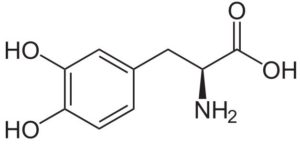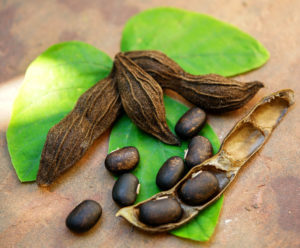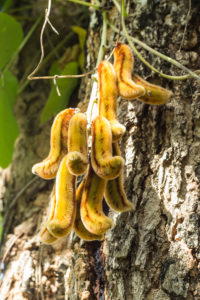Table of Contents
Key Takeaways
- L-DOPA is a vital amino acid precursor of neurotransmitters dopamine, epinephrine, and norepinephrine synthesized in the brain from l-tyrosine.
- Mucuna Pruriens is a natural source of L-DOPA, used as a nootropic to enhance brain function by increasing dopamine levels.
- L-DOPA from Mucuna Pruriens can improve memory, cognition, mood, and overall brain health while reducing stress and acting as an antidepressant.
- Opt for organic Mucuna Pruriens extract with higher L-DOPA concentrations (15% – 30%) to ensure better tolerance and efficacy, avoiding synthetic versions used for Parkinson’s treatment.
- Nootropic use of L-DOPA is generally safe and well-tolerated, but caution is necessary to avoid tolerance and dependence issues.
See my article on all of the supplements that have been shown to help with Parkinson’s here: Best Supplements for Parkinson’s Disease
L-DOPA (levodopa, L-3,4-dihydroxyphenylalanine) is an amino acid synthesized in your brain by the amino acid l-tyrosine. L-DOPA is a precursor of several neurotransmitters including dopamine, epinephrine, and norepinephrine.
Mucuna Pruriens contains naturally occurring L-DOPA in high concentrations. And is used as a nootropic because dopamine itself cannot cross the blood-brain barrier.
Dopamine and norepinephrine are essential for memory, cognition, and a positive mood. A lack of either of these neurotransmitters can lead to a lower mood state, loss of memory, brain fog, poor energy, and more. And if left unchecked will eventually result in neurodegenerative diseases like Parkinson’s.
L-DOPA helps:
- Brain Health. L-DOPA helps to increase growth hormone levels in the brain. Boosting the production of neurons and glia cells affecting the formation of memories, and overall brain health.
- Neurotransmitters. L-DOPA is a necessary precursor for your brain to make dopamine. And dopamine is then synthesized into the neurotransmitters epinephrine, and norepinephrine. Affecting cognition, learning, memory, movement, motivation and pleasure.
- Neuroprotection. L-DOPA produces neuromelanin which is similar to the melanin pigment in your skin. In your brain they absorb toxic quinones, and chelate heavy metals like mercury and lead.
What is L-DOPA (Mucuna Pruriens)?
L-DOPA (levodopa, L-3,4-dihydroxyphenylalanine) is an amino acid that’s naturally synthesized in your brain by the amino acid l-tyrosine.

L-DOPA is a necessary precursor to the synthesis of the neurotransmitter dopamine. Called a catecholamine, dopamine is then synthesized into the other catecholamines epinephrine (adrenaline) and norepinephrine (noradrenaline).
Unlike Dopamine, L-DOPA can cross the blood-brain barrier. This is why we supplement with L-DOPA rather than dopamine.

And for a dopamine boost, neurohackers use Mucuna Pruriens, which contains high levels of L-DOPA.[i] This legume, native to the tropical regions of India, Africa and the West Indies, and also known as velvet bean, has been used in Ayurveda medicine since 1500 B.C.
The ancients used Mucuna Pruriens to treat things like snakebite, intestinal problems, sexual issues, and a melancholy mood.
Raising levels of the neurotransmitter dopamine in your brain helps regulate mood and cognition.[ii]
Mucuna Pruriens vs. L-DOPA: What’s the Difference?
Mucuna Pruriens is an extract of the velvet bean plant that grows 3 – 18 meters in height. L-DOPA (levodopa) is usually synthetic and made in the lab.
The natural version of L-DOPA from Mucuna Pruriens is generally well-tolerated by most people. And the compounds in the plant are bio-identical to those chemicals naturally made in your body. Not so with synthetic L-DOPA.
Synthetic L-DOPA is metabolized into dopamine in your body by an enzyme called aromatic L-amino acid decarboxylase (AADC). And the majority of synthetic L-DOPA will be converted peripherally (not in the central nervous system and brain). This can cause problems.
So when used therapeutically, as in treating Parkinson’s Disease, L-DOPA is administered in combination with an inhibitor of peripheral AADC. Drugs like carbidopa (or other AADC inhibitors) ensure most of the L-DOPA is preserved for conversion to dopamine in the brain. And not the rest of your body.
This is critical for nootropic users to keep in mind. Chronic, or prolonged use of synthetic L-DOPA can lead to things like dyskinesia. This is a movement disorder where neurological discoordination results in uncontrollable, involuntary movements.[iii]
I am not telling you this to dissuade you from using L-DOPA. Stick with an extract of Mucuna Pruriens and you should be fine.
How does L-DOPA Work in the Brain?
L-DOPA boosts brain health and function in several ways. But two in particular stand out.
- L-DOPA improves memory. It’s metabolized into dopamine in your body by an enzyme called aromatic L-amino acid decarboxylase (AADC). This increases dopamine levels in your brain.
Researchers at the University of Münster in Germany conducted a study with 40 healthy people. In this randomized double-blind study, they gave one group 100 mg of levodopa daily for 5 days. The other group took a placebo.
90 minutes later on each day, subjects were given a memory test based on vocabulary. The study found that levodopa significantly enhanced the speed, overall success, and long-term retention of novel words.[iv]
- L-DOPA promotes brain health. Research suggests Mucuna Pruriens protects your brain by regulating cognitive and neural functions. And even encouraging neural activity.
Researchers in India showed that Mucuna Pruriens is a potent antioxidant. They performed assays to evaluate the enzymatic and nonenzymatic antioxidants in extracts. They found high levels of flavonoids, alkaloids, tannic acids, gallic acids, quercetin equivalents, and sitosterol equivalents.[v]
All of these compounds scavenge for free radical in your brain. Free radicals are formed during normal brain activity, like the synthesis of ATP that is produced in your mitochondria.
Your brain is equipped to eliminate some of these free radicals on its own. But especially in today’s environment in which we live, your brain is overwhelmed. Free radicals cause inflammation which damages and can kill brain cells. Affecting memory, learning, recall, cognition and mood.
Mucuna Pruriens has been proven to be a very effective brain inflammation fighter. It even has the ability to chelate heavy metals like mercury and lead in brain cells. And it’s antibacterial.[vi]
Mucuna Pruriens helps your brain make naturally occurring neuronal pigments called neuromelanin’s. They’re similar to the melanin found in your skin. And they’re often found in regions of your brain where dopamine is active.
The synthesis of neuromelanin’s in the various regions of your brain is an important protective process. The melanic component is generated through the removal of reactive/toxic quinones that would otherwise cause neurotoxicity.
This melanic component promoted by Mucuna Pruriens is what chelates and accumulates toxic, heavy metals like mercury and lead.[vii] Preventing them from damaging brain cells.
How things go bad when you have low dopamine
As we get older, our brain chemistry and energy metabolism changes.
↓ Dopaminergic neurons are damaged or die
↓ Dopamine levels decline
↑ Stress levels increase
↓ Long-term memory and mood decline
All of these age-related changes are contributing factors to the neurodegenerative diseases of aging, including Parkinson’s Disease.
L-DOPA benefits for brain health
Mucuna Pruriens natural herbal supplement extract contains high levels of L-DOPA, the precursor to the crucial neurotransmitter dopamine. Dopamine is further synthesized into the neurotransmitters epinephrine (adrenaline) and norepinephrine (noradrenaline).
Dopamine plays a critical role in learning and absorbing new information. Increasing brain levels of dopamine helps regulate mood and boosts cognition.
Research also suggests that Mucuna Pruriens provides antioxidants that defend against oxidative damage caused by free radicals.[viii]
How does L-DOPA feel?
Neurohackers report that using Mucuna Pruriens helps in multi-tasking, improving motivation, more focus, less stress, and a sense of calm.
You could find your energy levels increase, less brain fog, and a boost in overall mood. A more positive outlook on life. And an increase in libido.
L-DOPA Clinical Research
Mucuna Pruriens (L-DOPA) as an
alternative for Parkinson’s Disease
Researchers at the Parkinson’s Institute located at the University of Milan in Italy recruited 18 patients with advanced Parkinson’s Disease. The patients were given either ground Mucuna Pruriens powder (standardized 5.7% L-DOPA) or prescription form of levodopa containing a dopa-decarboxylase inhibitor. And then measured motor improvements at 60 and 90 minutes after using the supplement or drug.
The researchers found Mucuna Pruriens standardized powder produced reduced Parkinson’s symptoms equivalent to the prescription version of levodopa. But with significantly fewer problems with dyskinesias. The team concluded the “Clinical effects of high-dose Mucuna Pruriens were similar to levodopa alone at the same dose, with a more favorable tolerability profile“.
Mucuna Pruriens reduces stress
A study was conducted to assess the role of Mucuna Pruriens in infertile men. It was done at King George’s Medical University in Lucknow, India. The study included 60 men who were undergoing infertility screening. And no surprise here; were found to be suffering from stress.
The control group in this study were 60 age-matched men who had initiated at least one pregnancy. The infertile men were given 5 grams of Mucuna Pruriens seed powder per day for 3 months. Semen samples were collected at the beginning of the study. And after 3 months of treatment.
The researchers found that treatment with Mucuna Pruriens significantly decreased stress levels. And increased sperm count to the same level as the fertile control group of men.
They “concluded that M. pruriens not only reactivates the anti-oxidant defense system of infertile men but it also helps in the management of stress and improves semen quality.”[ix]
L-DOPA improves learning
This study in Germany was done with 40 healthy subjects. They were given 100 mg of L-DOPA or a placebo for 5 days in a randomized, double-blind trial.
Subjects were trained on artificial vocabulary using a high-frequency, repetitive approach. This was done 90 minutes after L-DOPA administration on each day of the trial.
The researchers found that L-DOPA significantly enhanced the speed, overall success, and long-term retention of the words.[x]
L-DOPA as an anti-depressant
Increasing dopamine in your brain also boosts your mood and libido. This study was done in India with mice. Researchers used the well-known Forced Swimming Test (FST), Tail Suspension Test (TST), and Chronic Unpredictable Mild Stress (CUMS) test.
The mice were fed Mucuna Pruriens seed extract, and then evaluated while performing, well… what mice do in the lab. The research team found that Mucuna Pruriens seed extract has significant antidepressant qualities. Which would simply verify what we already know in humans.[xi]
Using Mucuna Pruriens extract is a great anti-depressant.
L-DOPA Recommended Dosage
L-DOPA (Mucuna Pruriens extract) suggested dosage for cognitive benefits is 250 – 500 mg twice per day. Most Mucuna Pruriens extracts only contain 15 – 20% L-DOPA. So you may need to adjust your dose up or down depending on how you respond to this supplement.
You may also find that you need to cycle the use of L-DOPA (Mucuna Pruriens). And use it only 4 or 5 days a week. This can help avoid tolerances and dependencies (which are common with any dopamine agonist). DO NOT attempt to cycle this nootropic if you are using it to treat Parkinson’s Disease.
If you are using Mucuna Pruriens extract (L-DOPA) for Parkinson’s Disease you will likely need 500 – 1,000 mg Mucuna Pruriens 3 or more times per day. And look for a Mucuna Pruriens extract (98% L-DOPA).
See my article on all of the supplements that have been shown to help with Parkinson’s here: Best Supplements for Parkinson’s Disease
L-DOPA Side Effects
L-DOPA is produced naturally in your body. So is considered well-tolerated and safe. And L-DOPA from Mucuna Pruriens extract is particularly well tolerated by most people.
Research shows that the natural form of L-DOPA from Mucuna Pruriens compared to synthetic versions of L-DOPA provides similar results. But without the common side effects of nausea, vomiting, and involuntary muscle movement.[xii]
But be very careful when working with dopamine. Too much and you can experience symptoms like hair loss, auditory or visual hallucinations, psychosis, Dyskinesia and more.
Of course, if you begin to experience any of these side effects, stop supplementing with L-DOPA (Mucuna Pruriens) immediately.
Like any natural supplement, it’s always better to use an organic source.

Type of Mucuna Pruriens (L-DOPA) to buy
Mucuna Pruriens is typically available in powder, capsule or tablet form. Some are pure, dried Mucuna Pruriens powder.
Several manufacturers offer Mucuna Pruriens extracts ranging from 15% – 30% L-DOPA. Or they tell you how many mg of L-DOPA is in each capsule or tablet.
A few manufacturers call it “Velvet Bean Extract” or “Mucuna Extract” with the percentage of L-DOPA in each capsule or tablet. It’s the same as Mucuna Pruriens.
Try to find “organic” or “certified organic” if you can. And for Nootropic use, avoid synthetic L-DOPA which is typically used to treat Parkinson’s Disease.
Nootropics Expert Recommendation
L-DOPA (Mucuna Pruriens) dosage 250 – 500 mg twice per day
 I recommend using L-DOPA as a nootropic supplement.
I recommend using L-DOPA as a nootropic supplement.
Your body does synthesize some L-DOPA on its own. And converts it into the essential neurotransmitters dopamine, epinephrine, and norepinephrine.
But as you get older, dopamine receptors die or become unresponsive. Or your body doesn’t convert the necessary amino acids well enough to supply the neurotransmitters you need for an optimized brain.
L-DOPA is helpful to boost energy and motivation levels, memory, clear brain fog, improve mood and libido.
L-DOPA is especially helpful for those suffering from neurodegenerative diseases like Parkinson’s. And the natural form of L-DOPA from Mucuna Pruriens often offers better results with fewer side effects than prescription drugs.
I suggest starting with a dose of 100 – 250 mg twice daily for nootropic use at first. And you may find that you need to cycle L-DOPA. Use it for 4 or 5 days and take a break. Tolerance is often a problem when working with dopamine. As is dependence or addiction.
If you are using Mucuna Pruriens (L-DOPA) for Parkinson’s Disease, please see my article on all of the supplements that have been shown to help with Parkinson’s here: Best Supplements for Parkinson’s Disease









Join The Discussion - 411 comments
Dre
November 10, 2021
For a week or 2 I went overboard with mucuna, and other stuff(energy drinks, I think one contained a dopamine source). As a result had a panic attack, hear palpitations and a ”burning brain” for days. These have passed since, but restless leg syndrome seems to be aggravated. I did cut off the mucuna without tapering off. Also, I have been recently taking a ashwaganda/bacopa supplement combo, but the restless leg syndrome seems to be still bad,or even worse?
What do you think I should do?
Dre
November 10, 2021
Phenibut has also been an issue.
David Tomen
November 12, 2021
Dre, were your using Phenibut with Mucuna Pruriens? Using either of these supplements in excess is a really bad idea and will effect different people in different ways. But none of them good.
Lynn Hegedus
October 10, 2021
Hi David,
Thank you for this information! I have fibromyalgia and recent studies have shown that it may be caused by low levels of dopamine and have therefore approved low doses of abilify. I would rather take a natural product, so am hoping mucuna supplements would help. Do you know anything about this or have any thoughts? Thanks so much for your time!
David Tomen
October 11, 2021
Lynn, I have also heard that fibromyalgia may be cause by low Thyroid hormone Free T3. And that has been my experience because once I increased my thyroid hormone levels fibromyalgia went away.
But if what you are sayin about low dopamine is true then a safer and more predictable way to increase dopamine is with L-Tyrosine. And L-Tyrosine takes part in the formation of thyroid hormone (with iodine) as well.
Lynn Hegedus
October 11, 2021
Thank you so much! I hadn’t heard the thyroid connection before and will definitely check my levels. I really appreciate your feedback and for responding so quickly!
Lynn Hegedus
October 11, 2021
One more question…are there any other supplements I should take with the L Tyrosine to help increase my dopamine? Thanks!!!
David Tomen
October 12, 2021
Lynn, I’m glad you asked because most people miss this. The cofactors required to produce dopamine and the other catecholamines include Vitamin B3 (niacin), Vitamin B6 (P-5-P), Vitamin B9 (methylfolate), Vitamin B12 (methylcobalamin), Vitamin C, boron, copper, iron, manganese, and selenium.
Ed
September 20, 2021
Hi David,
I have ADD, and my prescription stimulants are really helpful at giving me the ability to give my full attention and all of my energy to my work.
However, I can’t take my prescription stimulants, because they reduce my ability to rapidly switch between external tasks and internal thoughts.
Additionally, I’ve found that prescription stimulants reduce both my brain’s ability to generate cascades of spontaneous thoughts, and my brains ability to create abstract associations between such thoughts. As a professional creative, this is a dealbreaker.
(After doing some research, it turns out that there was a recent study showing this to be true. Here is the link to the 2020 study, if interested: https://pubmed.ncbi.nlm.nih.gov/32067136/)
All this to say – I wanted to test out Muca Pruriens to see whether or not it causes the same side effect, and potentially use it as an alternative to methylphenidate. I’d love to get your opinion on this. Would using Mucuna Pruriens instead of methylphenidate be a relatively safe alternative? In other words, are there any short-term or long-term risks with MP that you don’t find with methylphenidate?
Thank you!
David Tomen
September 21, 2021
Ed, that study was done with four rhesus monkeys who were NOT ADHD and NOT human (obviously). IF they had a sample size of a thousand and they were human then it would catch my attention.
There have been several studies over the last 5 decades that demonstrate stimulants help do what they are supposed to do when used by people who are truly, clinically ADHD or ADD. The same trials were done with those who were not ADHD or ADD and the drug did not provide the same benefit.
I do not think anyone has an explanation for this but one thing we know for sure is that they work for many, many people dealing with ADHD.
That said, you will have more success using stimulants if your follow my ADD protocol outlined on this page: https://nootropicsexpert.com/best-nootropics-for-adhd-add/. With the stack in the yellow box you are supporting stimulant use and providing brain repair at the same time. AND you provide what your brain needs “to rapidly switch between external tasks and internal thoughts”.
And use L-Tyrosine instead of Mucuna Pruriens. Save the L-DOPA for if and when you get Parkinson’s Disease.
Freedom
August 11, 2021
Hi, I am trying to understand if I can take Mucuna Puriens extract or powder in addition to Ritalin, or perhaps on weekend “holidays” from Ritalin. I prefer not taking Ritalin every single day and it also helps me not build tolerance when I take a few days off, seems to be 3 to 4 that’s the magic number.
So, does Mucuna Puriens interact with low dose Ritalin (20 mg a day) if taken on same day, OR, can it be taken on separate days when on holiday from Ritalin, with no adverse affects?
Thanks.
David Tomen
August 12, 2021
You can try it. But I think you’ll have more success by using L-Tyrosine which is two steps away from making dopamine. It’s easier to dose and safer to use long-term.
L-DOPA on the other hand immediately makes dopamine. There is no “wiggle room” for error. L-DOPA is used to treat Parkinson’s Disease. And all you are doing is supporting the use of Ritalin. Big difference!
Charles
July 12, 2021
Hello! Just for confirmation on how I’m reading this…I have a product that is listed as:
Mucuna Puriens Extract – 500mg
L-Dopa (standardized to 20%) – 100mg
So for your suggested dose of 250-500mg a day, am I going off of the Mucuna Puriens Extract noted here, or the L-Dopa listed here? That could be the difference in one pill or three for a dosage.
Thanks!
David Tomen
July 13, 2021
Charles, that is the problem with Mucuna Pruriens extracts. I suggest you contact the manufacturer and ask them what they recommend for dosage.
I do not mean for that be a flippant answer by any means. But that’s the problem with trying to figure out how much L-DOPA you are getting from a Mucuna Pruriens supplement.
Jimmy Coderre
June 3, 2021
Hi David,
Just before I ask some informations, I just want to say that I love your content and what you are doing for us. With that being said, here’s my questions:
1- Does mucuna can downregulates dopamine receptors if taken too often?
2- What would be the best supplement to upregulates dopamine receptors ?
3- Should I take mucuna with serotonin rich foods to balance with dopamine?
Thank you for reading my message and have a good day
David Tomen
June 4, 2021
Jimmy, it depends on how your system handles Mucuna. If things are relatively normal and healthy then is should not down regulate anything long-term as long as you stay with recommended dosages.
NAC and Aniracetam are great for supporting dopamine receptors. Along with something to boost BDNF.
Dim
May 8, 2021
Dear Mr. Tomen,
Is it safe to use L Dopa, Lithium Orotate, and Mind Lab Pro (morning), and L Tryptophan (at night)?
Thank you very much
David Tomen
May 8, 2021
Dim, it should be safe but I don’t normally recommend L-DOPA unless you are dealing with Parkinson’s. Better and safer to use L-Tyrosine.
Dim
May 10, 2021
Thank you, David,
I mean Mucuna Pruriens, I use it for three days now and I just love it! It already helped me to focus on work!
David Tomen
May 10, 2021
Dim, not a problem. Just please be careful on how much Mucuna Pruriens you use depending how much L-DOPA it contains.
Evan
March 31, 2021
David if my mucuna pruriens is 20% l dopa / 500mg what is a safe dose I could use? Also, I read what you were saying about if it makes you sleepy you could be releasing metals. What if sometimes it makes you sleepy and sometimes it doesn’t? Furthermore, can I potentially get rid of whatever I’ve accumulated by taking enough? I lived near burn pits in Iraq in 07-08 and since that deployment, I have just never felt as sharp. I don’t know if it’s me making excuses for my shortcomings or if it’s real but between those burn pits and IEDs, advanced math became a lot more difficult to conceptualize and fully understand.
David Tomen
April 1, 2021
Evan, start with 500 mg twice per day and see how it works for you. I would not exceed 1,000 mg twice per day especially long-term because you end up upsetting your dopamine/serotonin balance. To be safe you should be using 500 mg L-Tryptophan before bed which increases serotonin. And goes on the make the sleep hormone melatonin.
Heavy metal chelation happens because of neuromelanin synthesis from excess dopamine that hasn’t been used via synapses (https://www.ncbi.nlm.nih.gov/pmc/articles/PMC2582310/). It’s not L-DOPA per se that does this but rather it is dopamine. So you can do the same thing by using L-Tyrosine to increase dopamine.
You’ll find other nootropic supplements that chelate heavy metals here on Nootropics Expert as well. Use the search bar top right of the top menu and search for the keyword phrase in parenthesis “heavy metals”.
Evan
April 2, 2021
Thank you for the prompt reply!